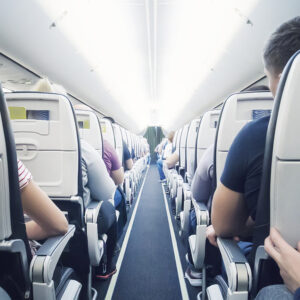As summer travel ramps up to pre-pandemic levels, there is a perfect storm of issues affecting air travel in Florida.
Airports across the state are experiencing a mounting number of flight cancellations and delays, much of which can be traced to a tussle between commercial airlines, private flights and the space industry, all over limited airspace. While there will always be unpredictable weather, among other issues, a détente must be found among these conflicting interests by federal agencies such as the Federal Aviation Administration, ensuring commercial airliners carrying hundreds are not constantly competing with private flights and rockets for room in the sky.
In recent years, the areas in Florida around hubs such as Orlando, Miami and Jacksonville have been flooded, mainly by an increase in the number of private flights to those destinations. With Florida becoming a favorite choice for leisure travel, it is unsurprising that more and more jet-setters flock to warmer weather. Just look at Palm Beach International Airport: private and charter flights in March jumped a shocking 65 percent to 12,239, compared to 7,412 in 2019. While this growth in demand is a net positive, benefitting businesses and residents, current management of the air above them could help stand in the way of a successful summer season.
Air traffic across the country is regulated on a “first come, first serve” approach, with private flights carrying a few passengers receiving the same weight as an airliner with hundreds. With more private planes, airlines and their travelers are seeing landing and takeoff delays or cancellations, and, unfortunately, many passengers do not have the same flexibility with their plans as those who can charter their flights.
The space industry’s effect is also weighing on commercial carriers. A single space launch can disrupt hundreds of flights and close countless miles of airspace to protect an aircraft from what is being launched and from the potential debris if something goes awry. A single SpaceX Falcon Heavy launch in 2018 affected 563 flights, created 4,645 total minutes of delays, and forced planes to fly an extra 34,841 nautical miles. Whether a passenger is a business or leisure traveler, flying solo or with family members, these disruptions are frustrating and inexcusable. And, with a renewed focus on the space industry in Florida, this issue will escalate and cause further complications.
There are limited hours to solve these pressing issues, and time is running out for the millions of Americans and visitors from abroad attempting to travel to Florida. While they are facing an immensely difficult task of reining in the forces vying for room among the clouds, the federal government — including FAA and NASA — should prioritize busy commercial flights to help smooth operations, reduce delays in the region, and re-establish trust among stakeholders, airspace users and American travelers alike.
Commercial airlines act as the bloodstream of the United States, delivering people and cargo on a minute-by-minute basis in what has become a delicate dance in increasingly busy skies. Putting a premium on keeping their operations on schedule will reap dividends at a time when countless Americans are hoping to enjoy their vacation after seemingly endless months of quarantine and COVID-related fears.

